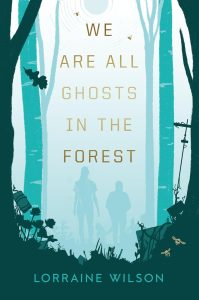We Are All Ghosts in the Forest by Lorraine Wilson: Review by Niall Harrison
 We Are All Ghosts in the Forest, Lorraine Wilson (Solaris 978-1-83786-144-6, 400pp, £18.99, hc). November 2024. Cover by Jo Walker.
We Are All Ghosts in the Forest, Lorraine Wilson (Solaris 978-1-83786-144-6, 400pp, £18.99, hc). November 2024. Cover by Jo Walker.
The image that I think will stay with me longest from Lorraine Wilson’s resonant new novel, We Are All Ghosts in the Forest, comes a little over halfway through the book. The novel’s protagonist, Katerina, has completed a trade in a village on the shore of Lake Peipus, one of hundreds of such trades she has completed since the collapse, offering a variety of herbal remedies in exchange for food. And, as has started to be the case more frequently in recent months, the encounter turned sour at the end, as the villagers realised that the region Katerina has travelled from is the region from which they have heard reports of a new disease. Her Indian heritage makes her stand out that much more (she reflects on ‘‘the pervasive everyday normality of weighing degrees of tolerance’’), but she still offers to help, to share her medicine. That somehow makes the suspicion worse, so she leaves, taking her boat back out onto the lake, and then it becomes too much: The whispers, her grief for her dead sister, the stoicism of the boy she has been trying to help, the people dying, the ‘‘hunger and fear and yearning for a half-remembered world.’’ She weeps, a small figure in a dramatic landscape, adrift on jade and teal water under thunderhead clouds. Then: a kingfisher, in a flash of blue, bringing her back to the world. ‘‘Enough,’’ she says to the sky. ‘‘Stop being ridiculous.’’
There are several things I like about this passage – its physicality, the way it conveys the feel of a body in the world; its bridging of scales, moving from the intimate to the widescreen and back; its willingness to undercut the resulting self-seriousness in a way that helps us to understand character – and they are characteristic of Lorraine Wilson’s writing. Her previous novel, Mother Sea (2023) thoughtfully explored the pressures on and within the community living on a small island in the Indian Ocean as they decide whether to leave in the face of rising sea levels; a novella earlier this year, The Last to Drown, vividly rendered the stark anima of its Icelandic setting. Her protagonists are also often individuals who, like Katerina, are shadowed by bereavements, and occupy a complex position within a small and isolated community. Yet there is always a way through or a way back: Wilson’s stories are as much about connection as they are about isolation.
All of which makes the central conceit of We Are All Ghosts in the Forest a perfect match for Wilson’s strengths. The collapse was caused by the end of the internet, not in a transcendent singularity, but in a ‘‘paroxysm of entropy’’: All the information that used to flow through the web scattered, diffused into the atmosphere, islanding the world and suffusing it with remnants. The remnants are called ghosts, and while some of them look like people (‘‘a silhouette of a man, monochrome-lit and fraying at the edges’’) they can take any form, from an audio clip of birdsong to a glitching photograph of a burning building. All of them have a tendency to latch on to new potential homes, which can be anywhere capable of storing a pattern: books, ‘‘with all their tempting hollow spaces’’; organisms, in particular those that already organise themselves into networks, such as forests and beehives; and human brains. Ghosts of stories without a home might latch on to a complementary pattern in a person’s mind; and that rarely goes well for the person.
It’s a wonderfully evocative setup, immediately provoking thoughts about how stories structure the world: Stories we tell about ourselves, about each other, about the world around us. In another writer’s hands the result could have been a kind of memetic blizzard, but Wilson’s narrative is relatively restrained, channelled through folkloric patterns, creating an eerie, ruminative atmosphere. I liked the use of a story-ghost as an untrustworthy search-engine on the grounds that story-ghosts are driven to hunt out endings, and the rationalisation of some of Katerina’s medicine-barriers as efficacious because they reduce electrical conductivity; and I loved the sense of the Estonian land come alive, given agency in a world in which the impacts of climate change are still widespread and worsening. Wilson’s focus, however, is determinedly personal: The rendering of a near future in quasi-fantastical terms make me think a little of Gwyneth Jones’s Bold as Love sequence (2001-2006), and of Rachel Pollack’s Unquenchable Fire (1988), but both of those works have a broader political engagement than We Are All Ghosts in the Forest, which prioritises the dynamics of a single community. A closer comparison might be Zoe Gilbert’s brilliant and lively Mischief Acts (2022), which imagines the recurring impact of Herne the Hunter on England’s forests over centuries, including into a rewilded near future; I think Wilson and Gilbert share an attentiveness to the impact of story on landscape, as well as on people.
If I have a cavil about the novel, it’s that I’m not sure Wilson pushes her story or her characters as far as she could. In the foreground, We Are All Ghosts in the Forest is a search. One day, a silent teenage boy with scarred hands and pale eyes approaches Katerina in the market with a note from his father asking her to look after him; the sender of the note appears to know Katerina, but she does not know him. After initial resistance, she finds herself on a mission to reunite father and son, which also becomes a journey towards confronting her own grief. In the background, there are rumours of a new, transmissible form of ghost-infection. Wilson’s shaping hand is clear and confident, the novel is filled with uncanny and striking moments, and the emotional climaxes are deeply felt (although once or twice I felt the dialogue wobbled: I’m not sure ‘‘Oh, give over’’ is an expression the German-born Katerina would use). And an ending that focuses on local connection is not a surprise: But it just felt, to me, a little too easy, a little flat compared to what comes before. Katerina was a photojournalist before the internet went away. She understands the power of an image, and so does Wilson; I’m going to be carrying a number of images from We Are All Ghosts in the Forest with me for a while yet, not just the scene on the lake. But I suspect the details of the ending will fade more quickly than the rest.
Interested in this title? Your purchase through the links below brings us a small amount of affiliate income and helps us keep doing all the reviews you love to read!
In Niall Harrison‘s spare time, he writes reviews and essays about sf. He is a former editor of Vector (2006-2010) and Strange Horizons (2010-2017), as well as a former Arthur C. Clarke Award judge and various other things.
 This review and more like it in the November 2024 issue of Locus.
This review and more like it in the November 2024 issue of Locus.
While you are here, please take a moment to support Locus with a one-time or recurring donation. We rely on reader donations to keep the magazine and site going, and would like to keep the site paywall free, but WE NEED YOUR FINANCIAL SUPPORT to continue quality coverage of the science fiction and fantasy field.
©Locus Magazine. Copyrighted material may not be republished without permission of LSFF.







